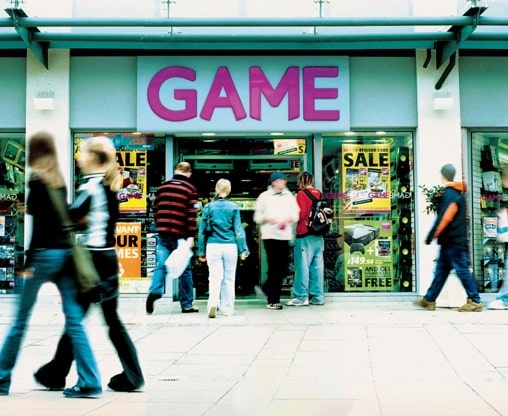
Europe’s biggest plastic-box video game retailer Game Group has warned its shares may become worthless, as it struggles to avoid the same fate that has beset retailers of physical-format music.
The group says it is trying to renegotiate its lending facilities with banks and its supply shortages with game publishers that are withholding stock while Game tries containing its financial problems.
“While these discussions are ongoing, it has not been possible to source new products from a number of suppliers,” it told investors on Monday.
“The board of Game is working actively to resolve these issues as quickly as possible. This includes ongoing discussions with suppliers, seeking access to the original facility or alternative sources of funding, and reviewing the position of all of its assets in the UK and international territories.
“It is uncertain whether any of the solutions currently being explored by the board will be successful or will result in any value being attributed to the shares of the company.”
EA, Capcom and Nintendo held back new releases from Game in February, concerned over payments, as FT reported, meaning Game misses out on Mass Effect 3.
Now EA CEO John Riccitiello says it is “more likely than it was even a month ago” that a “major European retailer” would not “survive”, FT reports:
“One of the challenges that we have this quarter is we did flag a risk on one of the major European retailers having trouble, costing us sort of mid-single-digit EPS. That now looks like all but a certainty … We’re still praying for the lenders to get rational and keep them in business.”
This is spookily familiar to anyone who has watched as high street music and entertainment retailers have gone bust over the last three years. HMV (LSE: HMV) was only rescued from its financial woes earlier in 2012 when its suppliers, the major music labels, took equity in the company in exchange for writing off payments due for stock.
That looks less likely in the games industry, where game publishers are increasingly keen on disintermediating high street retailers and releasing their games online.
Very tough time for all our teams around the world. We fight on, though. Plenty still to do, customer support humbling as always.
— Ian Shepherd (@IanAShepherd) March 12, 2012
Game Group is a traditionally cyclical business, reliant on boost effects from new-generation consoles and from Christmas sales, as well as from the industry’s decreasing number of A-list franchise releases. But the new interface hardware released between the current and next console generation has not boosted Game as much as new consoles would have, the industry is consolidating around just a few big-hitting franchises like Call Of Duty and Game’s Christmas 2011 sales were down 14.7 percent on the previous year.
It has worked to quickly develop its online business, including with web ecommerce for plastic games and by selling online credits for Facebook, Zynga and other games in stores.
Game’s market share is reported to be around 40 percent. Its disappearance from the high street would have a significant effect on boxed video game sales. But the games market is not yet ready to throw all its eggs in the online publishing basket.
Online retail prospects for Game appear limited since Sony (NYSE: SNE), Microsoft (NSDQ: MSFT) and Nintendo control distribution through their own consoles.
By mid-morning Monday, Game shares were trading 66 percent down on Friday’s close.